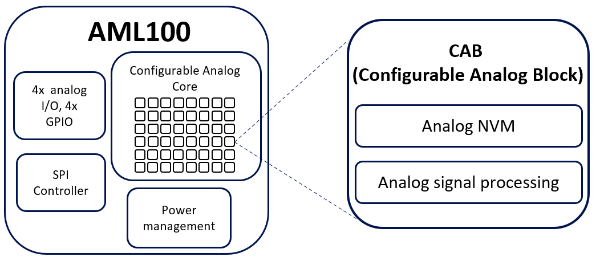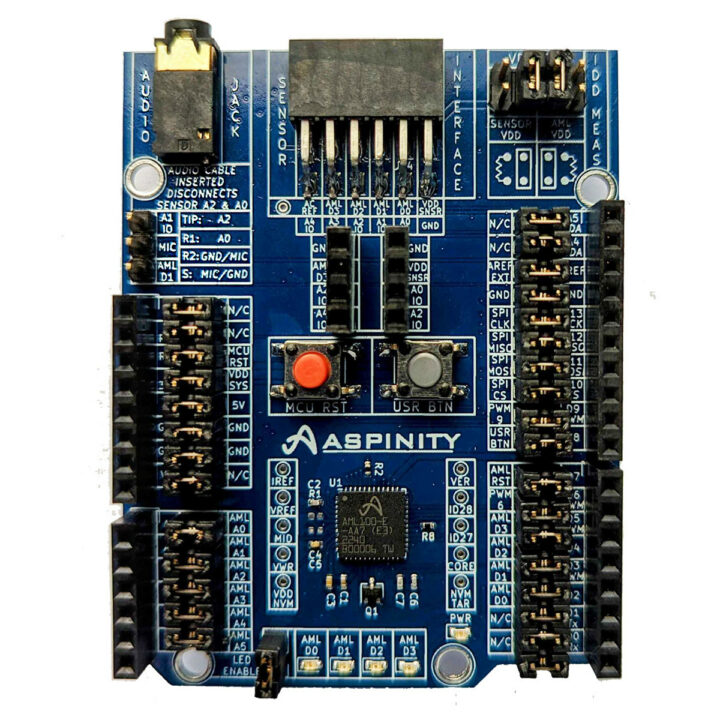Aspinity AB2 AML100 is an Arduino Shield based on the company’s AML100 analog machine learning processor that reduces power consumption by 95 percent compared to equivalent digital ML processors, and the shield works with Renesas Quick-Connect IoT platform or other development platforms with Arduino Uno Rev3 headers.
The AML100 analog machine learning processor is said to consume just 15µA for sensor interfacing, signal processing, and decision-making and operates completely within the analog domain offloading most of the work from the microcontroller side that can stay its lowest power state until an event/anomaly is detected.
Aspinity AB2 AML100 Arduino Shield specifications:
- ML chip – Aspinity AML100 analog machine learning chip
- Software programmable analogML core with an array of configurable analog blocks (CABs) with non-volatile memory and analog signal processing
- Processes natively analog data
- Near-zero power for inference and events detection
- Consumes <20µA when always-sensing
- Reduces analog data by 100x
- Supports up to 4 analog sensors
- Package – 7 x 7mm 48-pin QFN package
- Sensor interfaces
- 12-pin sensor interface for up to 4 analog sensors
- 4-pole audio jack for “electrical excitation and monitoring” of select AML100 analog I/Os
- Host Interface – Arduino Uno Rev3 headers
- Misc
- Headers for AML100 and sensor current draw measurements
- Onboard LEDs
- Dimensions – 7 x 5.1 cm (Arduino shield form factor)

Sensors are typically directly connected to an always-on microcontroller that receives all data from an analog-to-digital (ADC) chip and does all the processing, but the AML100 offloads most of the work by only sending relevant sensor data to the microcontroller which can stay in deep sleep mode most of the time. Aspinity claims the AML100 extends battery life by up to 20x and reduces always-on system power by >95% compared to traditional digital always-on systems.
While the AB2 AML100 Arduino Shield should work with pretty much any Arduino Uno-compatible board, Aspinity has prepared a glass break demo for Embedded World 2023 based on the Renesas EK-RA6M3 evaluation kit in the Quick-Connect IoT platform with the overall system consuming less than <45µA when in always-listening mode since the Renesas RA6M3 MCU in its deep sleep mode unless a glass break is detected. Target applications for the AML100 analog ML chip include surveillance sensors for home and commercial security systems, voice-enabled smart home and wearable devices, anomaly detection for preventive and predictive maintenance, and heart rate and other biometric monitoring.
It’s unclear whether the Aspinity AB2 AML100 board is available now, but it will be showcased along the Renesas Quick-Connect IoT platform in the Renesas booth at Embedded World 2023 (Hall 1, Stand 234) on March 14-16, 2023, in Nuremberg, Germany. More details can be found on the chip’s product page and the board’s announcement.
Thanks to TLS for the tip.

Jean-Luc started CNX Software in 2010 as a part-time endeavor, before quitting his job as a software engineering manager, and starting to write daily news, and reviews full time later in 2011.
Support CNX Software! Donate via cryptocurrencies, become a Patron on Patreon, or purchase goods on Amazon or Aliexpress. We also use affiliate links in articles to earn commissions if you make a purchase after clicking on those links.







Spot the sponsored post.